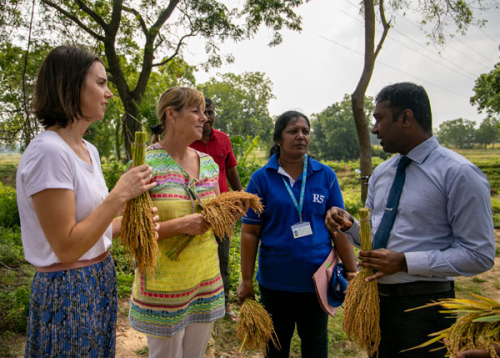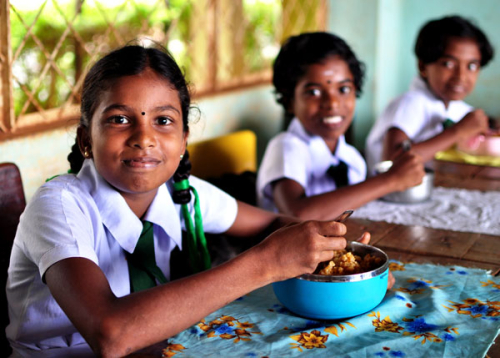Kate Sinclair’s work at the UN World Food Programme (WFP) in Sri Lanka started modestly enough.
In August 2018, she began a six-month internship during her PhD studies in Human Nutrition at McGill. Two years later, as an International Nutrition Consultant with WFP Sri Lanka, she supports the development, implementation and evaluation of a wide range of nutrition-related programs. These include school feeding, rice fortification, knowledge management and resiliency building, among others.
Little did Sinclair expect that the work would make her part of a Nobel Prize-winning team. But late last year she and her 20,000 WFP colleagues around the world were awarded the Nobel Peace Prize for 2020.
The award, presented in a virtual ceremony in December, recognizes the Rome-based UN agency “for its efforts to combat hunger, for its contribution to bettering conditions for peace in conflict-affected areas and for acting as a driving force in efforts to prevent the use of hunger as a weapon of war and conflict.”
The Nobel Prize “is such an honour for all of us working at WFP,” says Sinclair, who tuned into the ceremony from Sri Lanka. “Being awarded this prize is such a humbling moment for us all.”
First on the scene in some of the world’s most desperate situations
The largest humanitarian agency in the world, WFP delivers vital food assistance in emergencies. It is often first on the scene to deliver vital food to the victims of war, civil conflict, drought, floods, earthquakes, hurricanes, crop failures and natural disasters. About two-thirds of WFP’s work goes to people facing severe food crises, most of them caused by conflict, where people are three times more likely to be undernourished than those living in countries without conflict. In 2019, WFP assisted 97 million people in 88 countries.

The award by the Norwegian Nobel Committee “recognizes food as the pathway to peace and acknowledges the work of WFP staff who put their lives on the line every day to bring food and assistance to more than 100 million hungry children, women and men across the world,” Sinclair says.
A journey that began at McGill
Sinclair’s road to Sri Lanka began at McGill.
She was first drawn to McGill’s School of Human Nutrition because the Applied Master’s program allows participants to earn their Master’s degree while also completing their dietetics credentialing.
“It was only after taking a Public Health Nutrition course during my first semester, which was taught by Dr. Hugo Melgar-Quiñonez, [the Margaret A. Gilliam Faculty Scholar in Food Security at the Margaret A. Gilliam Institute for Global Food Security] who is now my PhD supervisor, that I was inspired by the work he was doing and switched to the thesis stream, allowing me to do a more in-depth research project,” Sinclair says. “Hugo’s passion and positivity has hugely motivated my ever-growing enthusiasm for global food security, nutrition and academia.”
Sinclair, who grew up in Red Deer, Alberta, pursued her burgeoning interest in global food security by doing research projects abroad, including a study on smallholder farmers in Haiti and another on food insecurity and women’s autonomy in Colombia.
“I have learned a tremendous amount from conducting research during my time at McGill, both professionally and personally,” she says. “These experiences helped prepare me for my role at WFP in many ways. It has honed my ability to adapt and work in different contexts with individuals from diverse backgrounds.”
Doing a lot with a little
WFP is funded entirely on donations. WFP Sri Lanka is a “small Country Office in a middle-income context” that faces constant funding challenges, Sinclair says. “However, we are quite an innovative and dynamic team, working closely with the government, which allows us to often ‘do a lot with little’.”
COVID-19, however, has presented a challenge “unlike any other,” Sinclair says.
In Sri Lanka, she and her colleagues are monitoring the situation closely, adapting existing programs to continue helping people in need, and working closely with the government to respond to needs as they arise.
In mid-March the Sri Lankan government closed schools to help curb the spread of the virus. But it meant that many children were suddenly cut off from the free meals they received as part of a long-standing national school meal program supported by WFP.

“With the protracted closure of schools and disruption to the school meal program, WFP together with the Government of Australia worked with the Ministry of Education and other government partners to supply take-home food rations as an alternative method of providing food security to children until the recommencement of the national school meal program,” Sinclair says.
Food security: Multifaceted challenge requiring multifaceted response
Despite tremendous research advances in food production; storage and processing; food safety; nutrition and health, food security remains a major global challenge. “From 2000 to 2015, the world witnessed a prolonged decline in the overall number of hungry people; however, recent estimates indicate that for the first time in 15 years this number is now on the rise,” she says.
It is a multifaceted problem that requires a multifaceted response. “We need nutrition-sensitive investment across the food system, including efforts to reduce food losses and enhance efficiencies,” she says. “Strengthening livelihoods and building resilience amongst smallholder farmers, particularly those who are vulnerable to recurrent natural shocks and climate change will be imperative. Redressing agriculture policies and incentives will be foundational in these efforts.”
And then there is conflict.
In awarding the Peace Prize to WFP, the Norwegian Nobel Committee noted that “the link between hunger and armed conflict is a vicious circle: war and conflict can cause food insecurity and hunger, just as hunger and food insecurity can cause latent conflicts to flare up and trigger the use of violence. We will never achieve the goal of zero hunger unless we also put an end to war and armed conflict.”
Watch the video made during Kate Sinclair’s original internship with WFP Sri Lanka in 2018
